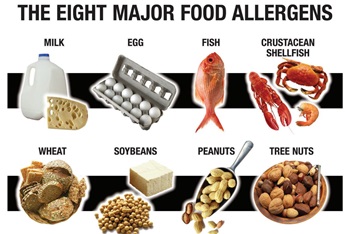By: Adam Friedlander, Specialist, Food Safety and Technical Services, Food Marketing Institute
 While tremendous efforts have significantly decreased the number of foodborne pathogens from entering our food supply, such as Listeria monocytogenes and Salmonella, the food industry is now facing another momentous challenge – effectively managing food allergens to prevent severe allergic reactions and recalls.
While tremendous efforts have significantly decreased the number of foodborne pathogens from entering our food supply, such as Listeria monocytogenes and Salmonella, the food industry is now facing another momentous challenge – effectively managing food allergens to prevent severe allergic reactions and recalls.
According to the Centers for Disease Control (CDC), more than 50 million Americans suffer from allergies each year. The prevalence of reported food allergies has significantly increased throughout the years with an estimated four to six percent of children and four percent of adults affected by food allergies.
The symptoms and severity of food allergy reactions can vary between people, ranging from a mild response (such as itchy, tingling tongue) to anaphylaxis. Each year, food allergy anaphylaxis is responsible for 30,000 ER visits, 2,000 hospital visits and 150 deaths, according to the Food and Drug Administration’s Center for Food Safety and Applied Nutrition (CFSAN).
The Food Allergen Labeling and Consumer Protection Act of 2004 (FALCPA) requires packaged foods to comply with federal allergen labeling requirements, including products packaged and labeled at retail. Any packaged food containing one of the eight major food allergens (i.e., milk, egg, wheat, peanuts, soybeans, tree nuts, fish and crustacean shellfish), or containing protein derived from the eight major allergens, must be declared on the food label.
As stated in the Reportable Food Registry, undeclared allergens continue to be the leading cause of total U.S. food recalls, representing 47 percent, while Listeria and Salmonella contamination collectively represent 44 percent. The root causes of undeclared allergen recalls are:
1. Wrong package/label;
2. Incorrect terminology;
3. Failure to carry forward information from an ingredient to the final label;
4. Cross-contact; and
5. Ingredient mislabeled by supplier.
The food industry plays a critical role in assuring a safe food supply for its customers. To assist the retail food industry better understand food allergen risks, FMI published a Retail Allergen Resource Guide, in 2016, to effectively address food allergen risks with store brand products; in-store practices and procedures; and employee and customer awareness and engagement.
Retailers are taking steps to raise awareness with customers about the use of allergen ingredients within fresh departments, as well as any allergen ingredient changes that are made with Consumer Product Goods (CPG). Grocery retailers can educate customers through print brochures, company webpages, social media, and in-store signage, such as the FMI Food Allergy Awareness Poster.
For more information, visit www.FMI.org/FoodSafety.


 Industry Topics address your specific area of expertise with resources, reports, events and more.
Industry Topics address your specific area of expertise with resources, reports, events and more.
 Our Research covers consumer behavior and retail operation benchmarks so you can make informed business decisions.
Our Research covers consumer behavior and retail operation benchmarks so you can make informed business decisions.
 Events and Education including online and in-person help you advance your food retail career.
Events and Education including online and in-person help you advance your food retail career.
 Food Safety training, resources and guidance that help you create a company food safety culture.
Food Safety training, resources and guidance that help you create a company food safety culture.
 Government Affairs work — federal and state — on the latest food industry policy, regulatory and legislative issues.
Government Affairs work — federal and state — on the latest food industry policy, regulatory and legislative issues.
 Get Involved. From industry awards to newsletters and committees, these resources help you take advantage of your membership.
Get Involved. From industry awards to newsletters and committees, these resources help you take advantage of your membership.
 Best practices, guidance documents, infographics, signage and more for the food industry on the COVID-19 pandemic.
Best practices, guidance documents, infographics, signage and more for the food industry on the COVID-19 pandemic.
